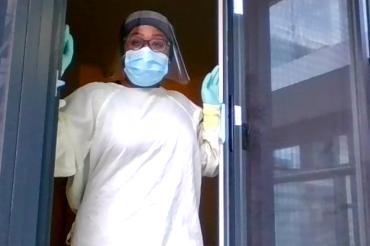U of T student – and front line worker – on the challenge of providing mental health care amid COVID-19

Published: May 21, 2020
On any given day during the pandemic, the news is full of stories about how the crisis is affecting people’s mental health. For Mariah Douglas, those stories come to life every time she works the night shift in the emergency room.
Douglas, who just completed her first year in the University of Toronto’s Master of Social Work program, is a program assistant at the Centre for Addiction and Mental Health (CAMH). It’s her part-time job, not her practicum placement, but she says she’s constantly learning – especially during the COVID-19 emergency.
“The number of people looking for mental health services has definitely increased – and so has the pace of my work,” she says.
For those with a pre-existing mental condition, the pandemic has made life that much more difficult. But there’s also a whole new cohort seeking help for the first time because they’re experiencing symptoms of anxiety and depression as a result of social isolation, financial strain and other pandemic-related pressures, according to Douglas.
“We’re seeing people in the emergency department who have never used the mental health-care system,” she says. “They come here because they feel lost and don’t know where to start.”
Douglas says almost every aspect of her job has been changed or complicated by COVID-19, including how she supports clients waiting to see a doctor. Wearing full protective gear, for example, can inhibit relationship-building.
“Safety trumps everything, of course,” says Douglas. “But it’s challenging to connect with people in distress through the mask and face shield. And physical distancing prevents me from sitting near them on a chair to get down to eye level.”
In her work, Douglas says she is drawing on foundational skills she learned in her first year at U of T’s Factor-Inwentash Faculty of Social Work, including a course taught by Professor Marion Bogo. “I put theories like active listening into practice all the time to navigate difficult interactions,” Douglas says.
There’s one tough conversation she now has every single night: telling family members of emergency clients that they can’t come into the hospital. Like other hospitals, CAMH currently has a strict no-visitor policy to help prevent the spread of COVID-19. “That’s one of my hardest tasks because usually family involvement is integral to our approach to care,” Douglas says.
When she’s not working directly with clients, Douglas is busy with new duties related to COVID-19, including working in partnership with the cleaning and food staff to ensure the environment is sanitized frequently. “I have to admit, I haven’t found my balance yet in all this,” she says. “I’m very tired, and it’s stressful.”
At home, there’s the added strain of physically distancing herself from family members. “Still, I find comfort in knowing that I’m not alone,” she says. “It’s been incredibly rewarding to see how we’ve come together as front line workers with one common goal – the wellbeing of the wider community.”
Next year, Douglas will enter the Mental Health and Health field of study at the Faculty of Social work. After graduation, she plans to continue to build her career in mental health care. Based on her current front line experience, she says she’s hopeful that the field will undergo a profound shift after the pandemic subsides.
“Instead of the old idea that only vulnerable people and those without coping skills are at risk for mental health challenges, I hope there’s a recognition that it can happen to anyone.”



